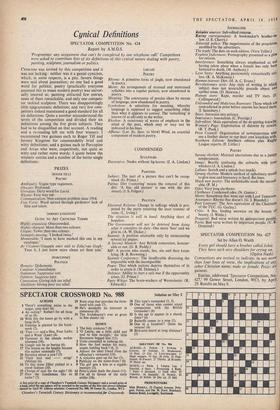Cynical Definitions
'Programme: any assignment that can't be completed by one telephone call.' Competitors were asked to contribute lists of six definitions of this cynical nature dealing with poetry, painting, sculpture, journalism or politics.
CYNICISM was invited by this competition and it was not lacking : neither was it a genial cynicism, which, in some respects, is a pity. Severe things were said about journalism; no one had a good word for politics; poetry (practically everyone assumed this to mean modern poetry) was univer- sally sneered at; painting attracted few entries, none of them remarkable; and only one competi- tor tackled sculpture. There was disappointingly little epigrammatic definition; and very few com- petitors indeed maintained a good standard for all six definitions. Quite a number misunderstood the terms of the competition and divided their six definitions among the five given subjects. They had to be disqualified on that account. A reading and a re-reading left me with four winners. I recommend two guineas each to Roger Till and Jeremy Kingston for commendably brief and witty definitions; and a guinea each to Porcupine and Arcas who were, respectively, not quite so witty and rather more wordy. I quote below the winners' entries and a number of the better single definitions :
PRIZES (ROGER TILL) POETRY
Ambiguity: Vogue-type vagueness.
Obscure: Profound.
Georgian: Dirty word for Lucid.
Rhyme: Easy way out. Communication: Non-existent problem since 1914.
Free Verse: Weed spread 'through gardeners' lack of
time and talent.
(JEREMY KINGSTON) GUIDE TO ART CRITICISM TERMS Highly organised: Overcrowded.
Highly charged: More than two colours.
Elegiac: Fewer than two colours.
Strangely moving: 'I looked twice.' Memorable: 'I seem to have marked this one in my
catalogue.' '
As Cizannel Gauguin once said to Zola, van Gogh: 'Face it, I just know more about art than you.'
(PORCUPINE) POLITICS
Honesty: Dishonesty.
Candour: Concealment.
Statement: Suppressio yeti. Opinion: Suggestio falsi. Concession: Giving rich tax relief. Abolition: Giving poor tax relief. (ARCAS) POETRY Rhyme: A primitive form of jingle, now abandoned in poetry.
Metre: An arrangement of stressed and unstressed syllables into a regular pattern, now abandoned in poetry.
Meaning: The conveyance of precise ideas by means of language, now abandoned in poetry. Symbolism: A substitute for meaning, whereby language is supposed to suggest something other than what it appears to convey. The 'something' is known (if at all) only to the writer.
Rhythm: A recurrence of waves of emphasis in the mind of the poet, which may or may not be indicated in his lines.
Afflatus: (Lat. flo, flare, to blow) Wind, an essential component of modern poetry.
COMMENDED SCULPTURE
Decorative: Nudes without fig-leaves. (J. A. Lindon.)
PAINTING
Subject: The part of a picture that can't be recog- nised. (G. Prince.) Patina: Dirt (`restoring' means the removal of this dirt. 'A fine old picture' is one with the dirt intact). (J. S. Fidgen,)
POLITICS
Electoral Reform: Change in suffrage which is pro- posed by the party receiving the least number of votes. (L. Irving.) The situation is well in hand: Anything short of hopeless.
The Government will not be deterred from doing what it considers its duty: One more `boo' and we give in. (A. W. Dicker.) Summit: A position attainable only by surmounting several icy piques.
A Second Munich: Any British concession, honour- able or not. (D. R. Peddy.) MP: A person who stands, lies, sits and then keeps lying. (R .B. Browning.) Summit Conference: The insufferable discussing the impossible with the incompatible. Peace: That which nations deprive themselves of in order to attain it. (M. Delaney.) Defence: Ability to start a safe war if the opportunity arises. (G. Prince.) Party Whips: The brain-washers of Westminster. (R. Edwards.)
JOURNALISM
Reliable sources: Sub-edited rumour. Racing correspondent: A bookmaker's brother-hr law. (J. E. Cherry.) Editorial policy: The megalomania of the proprietor. modified by the advertisers.
The truth: The date on each edition. (Vera Telfer.) Fearless Indictment: Pornography presented as a plea for reform.
Interference: Something always emphasised as, not having taken place when a female has only been battered to death. (M. Anthony.) Love Story: Anything passionately romantically sot. less. (R. A. McKenzie.) Human interest: Dirt. (H. A. C. Evans.) Revolutionary style: Any style of writing in which subject does not invariably precede object and epithet noun. (D. Hawson.) Human story: Rape, murder and TV stars. (f. Collingwood.) Unfounded and Malicious Rumours: Those which are contradicted in print before anyone has heard them. (I. Sainsbury.) Story: Intrusion into privacy. Inaccuracy: Journalism. (C. Prestige.) Sub-editor: Male equivalent of the de-gutting fishwife., Women's Page: 'Exploitation of dimwits by nitwits.
(R. T. Pook.)
Press Council: Organisation of newspapermen who use a feather duster to rap their own knuckles with. Northern Edition: Southern edition plus Rugby
League reports. (F. Littler.) POETRY
Sprung rhythm: Metrical aberrations due to a jumpY temperament.
Image: Beerily confusing the cobwebs with your whiskers (J. A. Lindon.) Lallans: Scotch and a splash (too much). Sprung rhythm: Modern method of upholstery meant to give ease and buoyancy to hard, flat lines. Much new poetry: The unthinkable made the unread-
able. (P. M.)
Odes: Very long clerihews.
Clerihews: Condensed odes. (N. Gunter.) Metre: Something that went out with Lord Tennyson, Assonance: Rhyme that doesn't. (G. J. Blundell.) Poet Laureate: The Arts equivalent of the Chairmoo of the TUC. (G. Garley.) Critic: A flea, feeding unaware on the bosom of beauty. (J. Winlo.) Doggerel: Bad verse written by unimportant people. Poem: Bad verse written by important people. (V. It Ormerod.)




























 Previous page
Previous page